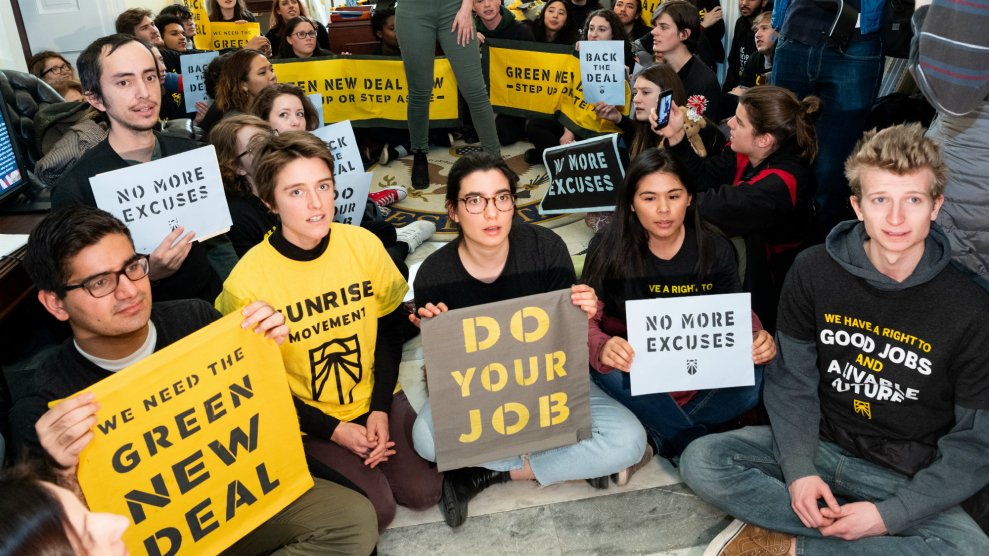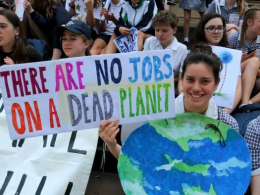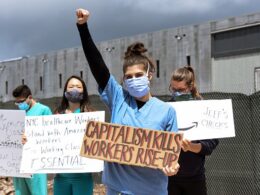The 2018/2019 school year marked the start of a global youth-led movement against climate change. Governments were pushed to declare climate emergencies and to propose action against the crisis. In this article, Myriam Poizat looks at the Green New Deal, a resolution put forward by Alexandria Ocasio-Cortez (AOC), left-wing congresswoman in the US, and how such a reform could be a step forward in the struggle for socialism.
July 2019 was the warmest month ever recorded on Earth, with temperatures peaking all across the globe and breaking records in at least 12 countries. (1) The heatwave in France, which hit a record 46 degrees Celsius, claimed the lives of 1,500 people. (2) This is but the latest of the ubiquitous examples of climate change impacting the real lives of billions of people as greenhouse gas pollution continues to increase, trapping heat in the atmosphere and raising the world’s temperature.
The production of unsustainable levels of CO2 emissions dates back to the late 19th century, with the development of industrial capitalism. However, half of all CO2 emissions have been produced since 1990, and just 100 companies have been responsible for 71% of CO2 emissions since 1988. 91% of all greenhouse gas emissions have been produced by the fossil fuel industry. (3)
To prevent global warming reaching the tipping point of 1.5 degrees Celsius above pre-industrial levels, which would make the effects of climate change irreversible, the Intergovernmental Panel on Climate Change (IPCC) has called on governments to take “unprecedented” action to achieve “rapid and far-reaching transitions”(4) in energy, agriculture, urban infrastructure and industrial systems. While the IPCC stance is worrying enough, many reputable scientists would consider those studies to be conservative, insisting that our emissions must be reduced even more dramatically than implied in this IPCC report.(5)
Capitalism is burning the planet
Despite the warnings of scientists worldwide, the political establishments around the world have resisted taking the necessary actions to end the extraction and the burning of fossil fuels, which is the largest piece of the pie to tackle. While Leo Varadkar’s government is planning to increase the Carbon Tax in the 2020 budget, (6) ensuring that poor and working-class people are forced to pay the price for the damage caused by big profiteer businesses, 33 banks (four of which have headquarters in Ireland) have invested $1.9 trillion in fossil fuel companies internationally since the signing of the Paris Climate Agreement in 2016. (7)
Notably, Britain, France, Canada and Ireland have all recently declared climate emergencies. Yet, instead of taking concrete measures to actually address the issue, such as massive investment in renewable energy or free public transport, these four countries give $27.5 billion annually to the fossil fuel industry in the form of tax breaks, financial incentives or support for companies exporting abroad. (8) It is not a lack of resources that is preventing a quick transition to renewable energy and zero-carbon economies, but the fact that those resources are being directed where profits can be made by banks and corporations.
And that’s in the more “liberal” capitalist states. However, the political crisis of the capitalist system has allowed far-right, bigoted rulers like Trump in the US and Bolsonaro in Brazil to gain presidential power and use their elitist and xenophobic agenda to deny the existence of climate change at all in order to block – alongside corporate lobbyists – any form of progress that could deal with this environmental crisis. For example:
- Big oil companies like Exxon have known about climate change and the impact of fossil fuels for the past 40 years, yet “the largest five stock market listed oil and gas companies spend nearly $200m (£153m) a year lobbying to delay, control or block policies to tackle climate change.” (9) This shows where the priorities of the profiteers have been lying.
- Since the election of Bolsonaro, fires have been rapidly increasing in the Amazon, with an 84% increase in August from the same period in 2018. (11) Not only is the destruction of the rainforest having an irreversible impact on the air and stabilisation of temperature, but the burning of the trees contributes to increasing the level of carbon emissions. Yet, those fires were not accidental. Since before his election, Bolsonaro has been talking about opening the rainforest to illegal invasion – destroying centuries of natural history, natural wealth, unrecorded biodiversity, but also human lives (especially indigenous lives) in the name of short-term profit.
The Green New Deal
Political establishments have thus been unwilling to take radical (or any real) action against climate change. Yet, in the past year, the youth movement led by Greta Thunberg has emerged across the globe, gathering 1.4 million young people for the first international strike on 15 March (12) and four million for the second on 20 September. This movement has demonstrated that the issue of climate change is a defining radicalising issue in the 21st century.
It was in the midst of this rising pro-climate-action mood that Alexandria Ocasio-Cortez (AOC), the popular left-wing congresswoman from New York City and a member of the Democratic Socialists of America (DSA), came forward last February with a Green New Deal (GND) resolution. (13) This 14-page resolution first offers a strong and correct stance against the inequalities in capitalist society, demonstrating the impacts that climate change could have on the majority of people, and more specifically on the poorest and most oppressed groups in society affected by low income, homelessness, unemployment, racism, sexism, ageism, and disabilities.
The GND presents the need to fight against socio-economic inequalities and climate change through the creation of “millions of good, high wage jobs in the US, to provide unprecedented levels of prosperity and economic security for all people in the US and counteract systemic injustices.” To do so, the resolution pushes for those new jobs to be highly unionised, to offer family-sustaining wages and other social services like medical leave.
The GND also rightly calls “(to meet) 100 percent of the power demand in the United States through clean, renewable, and zero-emission energy sources (i) by dramatically expanding and upgrading renewable power sources; and (ii) by deploying new capacity.” It correctly points in the direction of using the existing wealth and resources of society to massively invest in infrastructure and renewable energy. Specifically, it advocates a very moderate 70% tax on all income above $10 million. This is a step forward in popularising the idea of tackling wealth inequality and redirecting money where it is needed, as opposed to where it is profitable.
AOC’s progressive reforms were recently backed up and added to by self-described socialist presidential candidate Bernie Sanders in his $16.3 trillion GND plan, which calls for the creation of 20 million green jobs and the nationalisation of electricity companies. As well as challenging wealth inequality, Sanders’ plan aims at popularising a limited form of public ownership and real public investment for the needs of people and the planet. (14)
Capitalist resistance
However, in reality, even a moderate tax on the wealth and profits of big business and the super-rich, as proposed by Sanders and AOC, would be ferociously resisted by the capitalist class. This was illustrated well in 2018 with the vigorous campaign waged by Amazon in Seattle to oppose a minimal tax on its profits to fund social housing, which was proposed by Seattle City Councilmember Kshama Sawant of Socialist Alternative (co-thinkers of the Socialist Party in the US). Here in Ireland, the notorious “Apple Tax” case showed how both Apple and the Irish government would work together to protect Ireland’s status as a tax haven and to make sure Apple doesn’t pay the €14 billion it owes in unpaid taxes.
In August 2019, almost 200 big business owners, including multi-billionaire Jeff Bezos of Amazon, came forward with the need to change “the official definition of “the purpose of a corporation” from making the most money possible for shareholders to “improving our society” by also looking out for employees, caring for the environment and dealing ethically.” (16) They are seeking to give the impression that they will genuinely act to prevent climate change and defend the needs of ordinary people.
However, Amazon, for example, still has not paid any federal tax, has not ended secrecy over its role in carbon emissions, and its warehouse workers continue to work in highly precarious and inhumane conditions, having to skip bathroom breaks to keep their jobs. (17) Undoubtedly, this recent announcement reflects the pressure they feel from below and is an anticipation of further growing resentment of the nefarious role these CEOs and their companies play in society. Radical change in favour of the majority of people and the planet is anathema to these social parasites. In fact, it is a threat to everything they represent.
Capitalism and crisis
The rise in popularity for left and socialist ideas across the world is challenging the idea that neo-liberalism and capitalism is the only way of organising society, and can be seen in the increasing support for left-wing figures like Sanders in the US and Jeremy Corbyn in the UK. Corbyn’s recent promotion of a Green Industrial Revolution (a GND for the UK) demonstrates the possibility for such reforms to become more popular in the coming period, especially in the context of an emerging international climate movement. But it is important to remember that these reforms are being proposed in a period of economic stagnation and crisis for capitalism internationally. On the basis of the political status quo, this means the implementation of further neo-liberal policies and austerity measures, not the drastic increase in public investment that’s necessary to tackle climate change.
AOC’s GND echoes President Roosevelt’s New Deal of the 1930s, which was aimed at resolving the Great Depression through an increase in state intervention and social expenditure in the US economy. Fundamentally, it is a policy for reforming capitalism. However, it is often forgotten that not only were reforms gained by mass movements of workers organised throughout the country, but that the New Deal did not solve the economic crisis. This was only done through the creation of a war economy after the US entered the Second World War, when the fundamental interests of US capitalism were threatened by German and Japenese imperialism and it was compelled to mobilise all its resources in order to defeat them.
Unlike the Second World War, and despite the gravity of the climate catastrophe facing our planet, we have seen no willingness on the part of the capitalist class to invest its resources into ending this crisis. Their system is geared solely to maximize short-term profits, and the overarching interests of our planet are at best a fleeting afterthought.
Break with capitalism needed
The implementation of such a GND would not resolve the fundamental contradictions of the capitalist system. Even eradicating the use of fossil fuels, while absolutely being a hugely significant achievement, would still leave us with the problems of waste (in the form of overproduction and duplication), for example, and inequality generally that the system perpetuates. While we produce enough food to feed 10 billion people every year, more than 820 million still suffer from hunger every day. (18)
Likewise, a turn to 100% renewable energy would not end wasteful and exploitative industries, like fast fashion, which is the third-largest user of water globally “in a world in which around two billion people are already living in water-stressed areas” (19) and which exploits workers, often children and women, working under very precarious and dangerous conditions for extremely low wages. In 2018, “NGOs have reported on Bangladeshi sewing machine operators working for 90-100 hours a week yet not having enough to live on for the month.’ (20) As Karl Marx stated as early as 1867:
‘All progress in capitalist agriculture is a progress in the art, not only of robbing the worker, but of robbing the soil; all progress in increasing the fertility of the soil for a given time is progress towards ruining the more long-lasting sources of that fertility… Capitalist production, therefore, only develops the technique and the degree of combination of the social process of production by simultaneously undermining the original sources of all wealth—the soil and the worker.’ (21)
The main issue facing the planet, therefore, is that of the private ownership of wealth and resources by the capitalist class. In 2018, an Oxfam report showed that 1% of the world population owned 82% of global wealth. (22) As proposed by AOC, wealth inequalities could be challenged through the taxation of corporations and the super-rich. Yet this would not challenge the system as a whole. The 2015 Panama Papers scandal which revealed fraud, tax evasion, and the evasion of international sanctions, (23) is a clear example of the loopholes existing in the taxation system. The nature of weak capitalist economies like Ireland, craving foreign investment, allows the creation of tax havens where private companies can find refuge from corporate tax.
The movement for a GND therefore needs to challenge capitalism as a whole and fight for a socialist alternative. Bernie Sanders’ call for the nationalisation of electricity companies in the US and AOC’s proposal of ensuring that workers and communities participate democratically in the implementation of the GND at local level are very important steps forwards. However, it is only through expropriation or nationalisation of the key sectors of the economy that workers could democratically plan an economy based on the people’s and the planet’s needs and end the private race for profit.
The role of struggle
The climate movements emerging around the world, as well as those against inequalities and oppressions, show a rapid radicalisation of the youth and the working class. Last year, in the midst of the #NiUnaMenos movement in Latin America, the #MeToo movement in the US and the Repeal movement in Ireland, six million women and men took to the streets of Spain on International Women’s Day to protest against sexism and misogyny. The power of the working class was clearly on display, it is crucial this power is mobilised globally to end climate catastrophe and the profit driven system that perpetuates it.
As additional examples, the Yellow Vests movement in France emerged last November against the rise in carbon tax and successfully put pressure on the French neo-liberal government to increase the minimum wage and drop the last fuel tax, (24) showing the need for an environmental programme that will not make workers pay the price for capitalism’s greed but one that they will get behind. In Belfast, Harland and Wolff workers have been occupying the shipyard to fight for the 130 skilled jobs which the company recently put at risk. Not only have they been calling for the nationalisation of the industry, but they have also raised the idea of a transition to wind turbine production, showing the potential that a socialist economy could offer if workers were to democratically decide what is best for them and the planet.
As such, a GND like the one proposed by AOC could only come into place with the pressure of an organised mass movement of workers and oppressed people, demanding radical change for people and the planet. Sanders’ recent tweet declaring the need for the working class to finally win the US class war is a positive step towards popularising the need for working-class struggle. (25) The recent women’s marches, teachers’ strikes, school student walkouts, McDonald’s and Google strikes against inequalities and oppression also show the growing potential for united struggle in US society. Sanders should call for trade unions and workers to organise a real mass movement to challenge the profit-driven system, support a socialist GND and fight against all forms of inequality and oppression.
If led by the working class, the struggle against climate change could be built around the solidarity of all working and oppressed people of different races, genders and nationalities, linking economic and social issues to capitalism, a system that perpetuates all forms of exploitation, inequality and oppression through its ruthless and insatiable drive for profit. If organised around a clear socialist programme, resources could be expropriated and democratically utilised to plan an economy based on the needs of the people and the planet, not profit.
[1] I. Gerretsen and J. Yeung. 2019. CNN. https://edition.cnn.com/2019/07/25/europe/europe-heat-wave-records-intl/index.html
[2] 8 Sept 2019, The Guardian, https://www.theguardian.com/world/2019/sep/09/summer-heatwaves-in-france-killed-1500-says-health-minister
[3] P. Griffin. 2017. CDP Carbon Majors Report. https://b8f65cb373b1b7b15feb-c70d8ead6ced550b4d987d7c03fcdd1d.ssl.cf3.rackcdn.com/cms/reports/documents/000/002/327/original/Carbon-Majors-Report-2017.pdf?1499691240
[4] M.R. Allen, O.P. Dube, W. Solecki. 2019. The Intergovernmental Panel on Climate Change. https://report.ipcc.ch/sr15/pdf/sr15_spm_final.pdf
[5] 2018. The Real News. https://www.youtube.com/watch?v=JSg4KpijU9k
[6] 2019. The Journal. https://www.thejournal.ie/budget-2020-discussions-carbon-tax-4802720-Sep2019/
[7] Bank of Montreal, Barclays, CITI, Scotiabank; 2019. Rainforest Action Network. https://www.ran.org/wp-content/uploads/2019/03/Banking_on_Climate_Change_2019_vFINAL1.pdf
[8] C. Farand. 2019. Climate Home News. https://www.climatechangenews.com/2019/06/24/four-countries-declared-climate-emergencies-give-billions-fossil-fuels/
[10] S. Hall. 2015. Scientific American. https://www.scientificamerican.com/article/exxon-knew-about-climate-change-almost-40-years-ago/; B. Franta. 2018. The Guardian .https://www.theguardian.com/environment/climate-consensus-97-per-cent/2018/sep/19/shell-and-exxons-secret-1980s-climate-change-warnings; S. Laville. 2019. The Guardian. https://www.theguardian.com/business/2019/mar/22/top-oil-firms-spending-millions-lobbying-to-block-climate-change-policies-says-report
[11] 2019. BBC News. https://www.bbc.com/news/world-latin-america-49415973
[12] A. Schipani. 2019. Financial Times. https://www.ft.com/content/d4920846-b527-11e9-8cb2-799a3a8cf37b; J. Watts. 2019. The Guardian. https://www.theguardian.com/world/2019/jul/25/amazonian-rainforest-near-unrecoverable-tipping-point; S. Cowie. 2018. DW. https://www.dw.com/en/brazil-experts-warn-of-bolsonaro-threat-to-the-amazon/a-46068377; J. Aguilera. 2019. Time. https://time.com/5662395/bolsonaro-reject-g7-pledge-amazon-fires/
[13] D.P. Carrington. 2019. The Guardian. https://www.theguardian.com/environment/2019/mar/19/school-climate-strikes-more-than-1-million-took-part-say-campaigners-greta-thunberg
[14] A. Ocasio-Cortez et al. 2019. https://www.congress.gov/116/bills/hres109/BILLS-116hres109ih.pdf
[15] L. Friedman. 2019. The New York Times .https://www.nytimes.com/2019/08/22/climate/bernie-sanders-climate-change.html; G. Krieg. 2019. CNN. https://edition.cnn.com/2019/08/22/politics/bernie-sanders-green-new-deal-plan/index.html
[16] S. Goodley and R. Neate. 2019. The Guardian. https://www.theguardian.com/business/2019/aug/19/leading-us-bosses-group-drops-principle-of-shareholder-first
[17] J. Dzieza. 2019. The Verge. https://www.theverge.com/2019/7/16/20696154/amazon-prime-day-2019-strike-warehouse-workers-inhumane-conditions-the-rate-productivity; S. Liao. 2018. The Verge. https://www.theverge.com/2018/4/16/17243026/amazon-warehouse-jobs-worker-conditions-bathroom-breaks
[18] Mercy Corps. https://www.mercycorps.org.uk/articles/quick-facts-what-you-need-know-about-global-hunger; J. Erdman. 2018. Medium. https://medium.com/@jeremyerdman/we-produce-enough-food-to-feed-10-billion-people-so-why-does-hunger-still-exist-8086d2657539
[29] Common Objective. https://www.commonobjective.co/article/the-issues-water
[20] A. McAlpine. 2019. RTE. https://www.rte.ie/brainstorm/2018/0321/948976-the-high-cost-of-fast-fashion/
[22] K. Marx, Capital, vol. 1, p638
[22] K. Hope. 2018. BBC. https://www.bbc.com/news/business-42745853
[23] 2016. BBC. https://www.bbc.com/news/world-35954224
[24] 2018. BBC. https://www.bbc.com/news/world-europe-46513189
[25] Link: https://twitter.com/berniesanders/status/1164228993169723398












